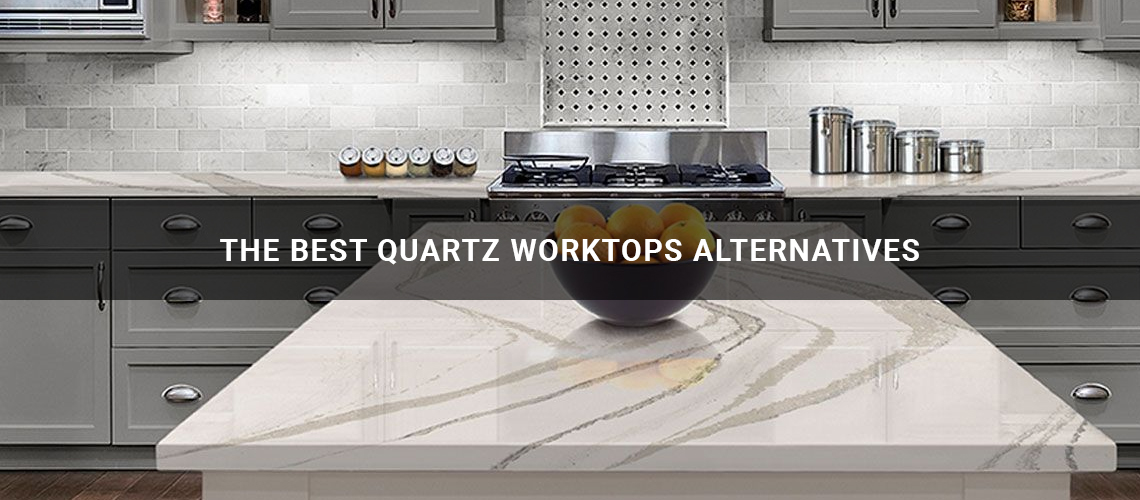As quartz can imitate the appearance of granite while remaining impermeable, it is an ideal material for kitchen counters. Quartz, a synthetic substance, may be manufactured in any number of hues and textures, unlike granite, whose hues are limited to those found in nature. Quartz and granite are both low-maintenance materials, although granite can tolerate greater temperatures, whereas quartz cannot be discoloured at all. We can provide you the best Quartz worktops in London alternatives.
In 1963, the Italian company Breton was the first to develop quartz worktops. After more than fifty years of licencing the Bretonstone technology to 52 firms throughout the globe, all quartz worktops continue to be sourced from the same facility. It became popular in the United States in the 1990s, gaining popularity rapidly in Italy and the rest of Europe.
In the past, quartz was a popular alternative to granite due to its ability to be fashioned to resemble marble and limestone. As a result, homeowners now have access to a greater variety of natural stones for use as kitchen worktops.
Alternatives to Quartz
Granite
These polished counters are solid, resistant to chipping, and unique. If you want them to last and look well, you should have a professional install and seal them.
Pros
- Each granite worktop is unique because it is carved from a single, unique stone slab during mining.
- There are numerous tints and tones available.
- Despite its porosity, granite can be professionally treated to make it more stain-resistant and generate seamless worktop
- You can locate London quartz worktops within your budget due to the vast price range.
Marble
Whether white or another colour, marble worktops give a kitchen a classic and warm appearance, it is softer and more porous than granite, making it more susceptible to scratches and stains. This should not be a problem, and your marble worktops should last for decades with proper care and use.
Pros
- Because they are heat resistant, these worktops are great for use in the kitchen, as hot pans and pots can be placed on them without damaging the surface.
- Due to the range of marble worktop alternatives and the fact that no two slabs are identical, the elegance and beauty of your kitchen or bathroom will be immediately increased.
Porcelain
It is feasible to achieve the appearance of granite using a porcelain worktop with a matte finish. Although it is less expensive than granite, it has the same advantages, such as a nonporous surface resistant to scratches and stains. It is durable and requires little upkeep. The colour scheme suggests stone, with black and white being the most prevalent hues.
Wood
Wood worktops are popular due to their rustic, inviting appearance and feel. Even though some people use their worktops as a cutting board, it is imperative to be careful with your blades and not accidentally damage them.
Pros
- Unlike other worktop materials, wood worktops instantly make a kitchen cosier. As they may be stained in any colour, you can easily tailor your kitchen or bathroom to your artistic preferences.
- You may personalise your worktops by choosing from various wood species, finishes, stains, and edge
- If you have utilised wood in your home, remodelling is unnecessary because it complements any aesthetic, from traditional to contemporary.
- Not only are these worktops more pleasing to the eye than those made of concrete or stone, but they are also warmer to the touch.
- If you’re worried about sustainability, using recycled wood for your worktops is a fantastic choice, and you can recycle it when you replace them.
Ceramic
Ceramic worktops are comparable to porcelain, except that porcelain is created using only white clay, but ceramic worktops can be created using a range of coloured clays. Similar to porcelain in look but less dense. Both materials are liquid-impermeable, making them resistant to spillage. The cost of ceramic is significantly less. Both can break upon impact. Unlike granite, both materials are straightforward to repair if broken. Similar to granite, ceramic has an exceptionally high degree of cleanliness.
Conclusion
Although granite worktops are commonly requested for residential and commercial construction, it is reassuring to know that alternatives exist. Porcelain is a less expensive material that resembles and performs similarly to ceramics. Quartz is the priciest available material, yet it has the most colour variations. Marble’s unique veining is one of its most noticeable characteristics. Ceramic is another inexpensive material that resists stains and spills, although it is more susceptible to damage from strong impact than granite.
Quartz worktops are a less expensive alternative to natural stone worktops. Quartz worktops are made from the natural mineral quartz and resins to create a hard surface available in various hues. Quartz worktops have great aesthetic value, but their installation is costly and time-consuming.
Worktop Express has an extensive assortment of inexpensive alternatives to quartz worktops if you’re looking for them. We are adept at supplying and installing each of these London quartz worktops. You may choose the material that best suits your needs, and we will do our best to deliver it in excellent shape. Quartz worktops in London installation is one of our areas of expertise, and we will strive to meet your needs quickly and efficiently. We aim to provide the most excellent standards and quality on the market at the lowest possible price.
